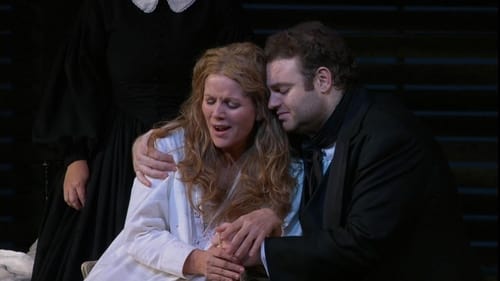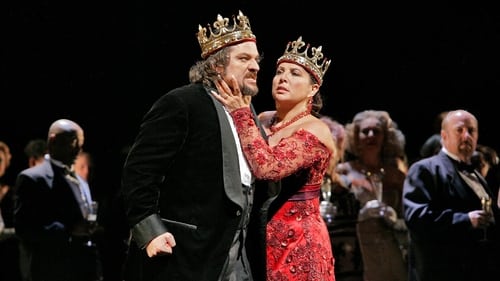
Lighting Design
Rarely has a theatrical world premiere been so warmly received as Dutch National Opera’s production of Arnold Schönberg’s late-Romantic Gurre-Lieder in 2014. The production fulfilled a fervent wish of principal conductor Marc Albrecht. The music of Gurre-Lieder is timeless, and so is its subject: a passionate, yet forbidden love. The story harks back to a Scandinavian saga, situated in Gurre. King Waldemar loves the girl Tove, who is a mysterious character, connected to both the world of people and the world of birds. The queen is jealous and has Tove killed. The Wood Dove tells of this in a moving song and the king accuses God of cruelty. A nightmarish scene follows, of a fierce army killed in battle, which rampages like a horde of ghosts. The radiant dawn at the end of Gurre-Lieder shows the insignificance of human destiny compared to the power of nature.

Lighting Design

Lighting Director

Lighting Design
Star soprano Anna Netrebko created a sensation in her first Met performances as the malevolent Lady Macbeth, the central character in Verdi’s retelling of Shakespeare’s tragedy. She is joined by Željko Lucic, who brings dramatic intensity and vocal authority to the title role of the honest general driven to murder and deceit by his ambitious wife. René Pape is Banquo, Joseph Calleja is Macduff, and Principal Conductor Fabio Luisi presides over Adrian Noble’s atmospheric production.

Lighting Manager
A tribute to marriage coming from a bachelor is a tad suspicious. But for Beethoven the idealization of the woman-bride was heartfelt and sincere. It has always been a unique opera starring a courageous wife who wows audiences. Fidelio is a moral title, associated with the ideals of liberty of the French Enlightenment. Nobility and commoners are united in their thirst for justice against the oppression of power. For once the faithful consort of a desaparecido wins her battle against a treacherous tyrant, and the collective joy truly is “nameless”, as is sung on the stage. Especially because the “our heroes to the rescue” finale is recounted by the triumphant symphonic flair of the quintessential musician. Beethoven really does bring the world to collapse at the conclusion of this opera, which begins like a delightful little comedy, but which scales and transcends all the summits of the dramatic-musical art.

Lighting Design
Before the Trojan War, Agamemnon gathered the Greek armies at the port of Aulis. The goddess Diane sent unfavorable winds to prevent the Greeks from sailing. Her oracle set a condition for Agamemnon: to earn the right to sail forth and destroy an innocent country, he would have to sacrifice his own daughter. Agamemnon accepted these terms and killed his young daughter Iphigénie on the altar. In his play Iphigenia in Tauris Euripides imagines that Diane plucked Iphigénie from that altar and delivered her to a temple in distant Tauride, where Iphigénie began to serve the enemy Scythians as Diane’s high priestess—all the while Iphigénie’s family believing her dead.

Lighting Coordinator
Renée Fleming has matured into one of the finest sopranos around at the moment, a true star with a sparkling personality and a velvet-toned voice that is capable of wringing the finest emotions out of works by Strauss and Tchaikovsky that from a lesser singer could sound rather cold and clinical. I wouldn't have thought her voice would be so well suited to Violetta Valéry in La Traviata, and it does take some getting used to, but I think she at least brings a distinct quality to the role with an emotional heart that isn't always necessarily there when a leading diva uses it primarily as a display for her vocal talents. It's served well also by Antonio Pappano's conducting of the Royal Opera House Orchestra in a traditional, but effective production by Richard Eyre.

Lighting Design
Verdi’s admiration for Shakespeare led to such masterpieces as Othello and Falstaff, and if the earlier Macbeth isn’t on their exalted level it’s still a powerfully dramatic opera that hews closely to the original’s story line. The MET’s production retains the dark aura of the opera while updating it to a vaguely post-modern context. So the witches are bag ladies in various stages of decrepitude, with children in tow. The Banquet Scene features lowered chandeliers, a plethora of chairs, and a slew of extras dressed in tuxedos and party gowns. Macbeth sports a leather coat, the soldiers are in drab brown uniforms and seem to have fingers on their triggers even when they’re supposed to be in non-threatening situations. Director Adrian Noble also has Lady Macbeth do an inordinate amount of writhing around and singing from a lying-down position, adding to the feeling that a less interventionist directorial hand might have generated more impact.

Lighting Design
Benjamin Britten's opera as performed by the English National Opera, with Philip Langridge in the title role.





